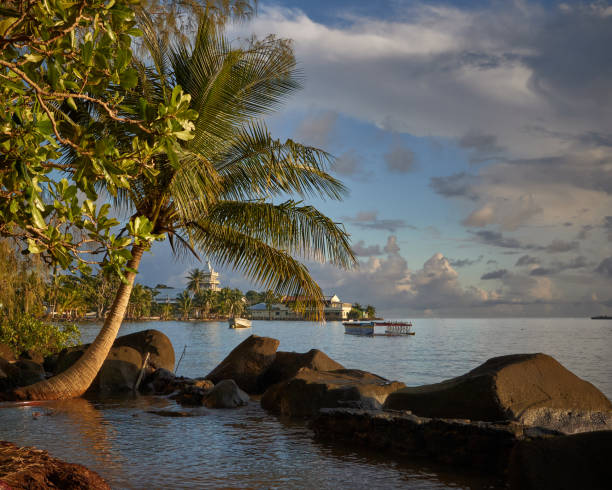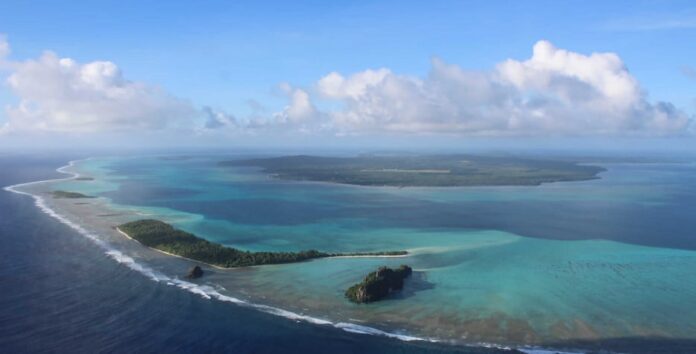An Overview of Wallis and Futuna Islands
A suitable business location, nestled in the South Pacific between Fiji and Samoa, Wallis and Futuna are a French overseas collectivity spanning approximately 274 square kilometers. Since 1961, the islands have operated under French law while maintaining their traditional Polynesian chiefdoms. Each island has its king and council of chiefs, working collaboratively with French administrators in a unique governance system that blends tradition and modernity.
The local economy is sustained by subsistence agriculture, fishing, and financial assistance from France. Although tourism remains underdeveloped, the islands’ untouched beauty and rich Polynesian culture hold immense potential for future growth.
Quality of Life in Wallis and Futuna
Wallis and Futuna offer a tranquil lifestyle centered on family, culture, and community. While modest compared to metropolitan France, the standard of living is comfortable for the islands’ population.
Key Characteristics of Daily Life
- Strong Community Values: Life revolves around extended families and close-knit village communities, fostering mutual support and cultural preservation.
- Basic Services: French funding supports healthcare and education. While these services meet fundamental needs, advanced medical care often necessitates travel to New Caledonia or mainland France.
- Limited Infrastructure: Utilities and transportation networks are basic, though improving. Internet and telecommunications services are slower compared to more developed regions.
Though the islands lack the sophistication of urban hubs, their natural beauty, low crime rates, and tight-knit communities offer an enviable quality of life.
Personal Tax Advantages in Wallis and Futuna
As a French overseas collectivity, Wallis and Futuna boast a tax system that significantly benefits residents.
Tax-Free Income
Residents are exempt from French personal income tax, making Wallis and Futuna an attractive destination for those seeking a tax-free lifestyle.
Social Contributions
While income tax is absent, minimal social contributions are required to fund essential services like healthcare and pensions. These contributions are notably lower than those in mainland France.
Business Taxes in Wallis and Futuna
The territory’s simplified tax framework is designed to encourage small-scale enterprises and attract investment.
Exemption from Corporate Income Tax
Businesses in Wallis and Futuna are not subject to corporate income tax, fostering an entrepreneurial environment and creating opportunities for local and foreign investors.
No VAT or Sales Tax
Unlike many other jurisdictions, Wallis and Futuna do not impose a Value-Added Tax (VAT) on goods and services. This alleviates financial burdens on both businesses and consumers, though import duties on certain goods contribute to government revenue.
Key Economic Sectors in Wallis and Futuna
Despite its limited economy, Wallis and Futuna have several industries that sustain livelihoods and offer growth potential.
1. Subsistence Agriculture
Agriculture forms the backbone of the economy, with residents cultivating crops like taro, yams, breadfruit, and bananas. Coconut farming for copra production remains a significant activity.
2. Traditional Fishing
Fishing provides a vital food source and supports small-scale trade. With proper investment, aquaculture and commercial fishing could drive economic expansion.
3. Handicrafts and Cultural Enterprises
Polynesian crafts such as weaving, wood carving, and tapa cloth production not only preserve cultural heritage but also serve as an income source, especially for women.
4. Public Sector Employment
French financial assistance sustains most formal employment, particularly in public services like education, healthcare, and administration.
5. Tourism Potential
Although nascent, tourism could thrive by promoting the islands’ pristine landscapes, traditional customs, and eco-tourism offerings. Targeting niche markets, such as cultural and heritage enthusiasts, could unlock significant growth.
Cost of Living and Inflation in Wallis and Futuna
The cost of living reflects the islands’ reliance on imports and their remote location.
Inflation Trends
Inflation remains low, but transportation costs for imported goods contribute to higher prices for non-local items.
Expense Breakdown
- Affordable Housing: Most residents live in family-owned homes, with low housing costs. Expats may encounter higher rental expenses for properties with modern amenities.
- Food Costs: Locally grown produce and seafood are inexpensive, while imported foods and household items are more expensive.
- Utilities and Transportation: Utilities are moderately priced, but transportation options are limited and costly due to the islands’ geographical isolation.
Adapting to local resources and a simpler lifestyle can help mitigate costs for residents and expats alike.
Simplified Taxation for Property and Services
Wallis and Futuna provide tax benefits that enhance affordability for residents and businesses.
No Property Tax
The absence of property tax makes owning land or real estate financially attractive, offering a key advantage for residents and expats.
Exemption from Sales and Services Taxes
The islands do not levy general sales or services taxes, simplifying transactions and reducing costs. However, import duties on goods entering the territory generate some government revenue.
Other Tax Exemptions
In addition to the absence of income and corporate taxes, the lack of other indirect taxes enhances Wallis and Futuna’s status as a tax-friendly jurisdiction.
Business Structures Available in Wallis and Futuna
Entrepreneurs can choose from various business structures that cater to their operational and financial needs.
1. Sole Proprietorships
Ideal for small-scale ventures, this structure is easy to establish. However, the owner is personally liable for business debts.
2. Partnerships
Partnerships enable individuals to share resources, responsibilities, and profits. They are well-suited for collaborative business endeavors.
3. Limited Liability Companies (LLCs)
LLCs offer liability protection, separating personal assets from business obligations. This structure is ideal for larger or higher-risk enterprises.
4. Cooperative Societies
Commonly used in agriculture and handicrafts, cooperatives pool resources and distribute profits among members, fostering community-based economic development.
5. Nonprofit Organizations
Nonprofits focus on cultural preservation and community initiatives, often relying on funding from local and international sources.
Wallis and Futuna’s unique combination of tax advantages, traditional lifestyle, and growth potential make it an appealing destination for residents, entrepreneurs, and investors. Whether exploring eco-tourism, small-scale enterprises, or real estate opportunities, the islands offer a peaceful yet promising environment for sustainable living and business development.
Essential Licenses for Starting a Business in Wallis and Futuna
Establishing a business in Wallis and Futuna requires acquiring specific licenses and adhering to local regulations.
1. General Business Registration
All businesses must register with the appropriate local authorities to obtain a general business license. This step ensures compliance with French law and local administrative rules.
2. Industry-Specific Authorizations
Certain industries, such as tourism and fishing, require additional permits from relevant government bodies or local councils. These ensure businesses meet industry-specific standards and regulations.
3. Environmental Permits
Businesses with potential environmental impacts, such as construction or tourism operations, must secure approvals from environmental authorities to mitigate risks and comply with conservation laws.
4. Work Permits for Foreign Entrepreneurs
Expatriates planning to operate businesses need work permits. The application process is straightforward, particularly for ventures contributing to the local economy.
Opportunities for Expats to Foster Business Growth
Wallis and Futuna’s modest economy presents unique opportunities for expatriates to drive growth and innovation.
1. Unlocking Tourism Potential
Expats can capitalize on the island’s natural beauty by investing in eco-lodges, guided cultural tours, or adventure tourism experiences. Sustainable tourism projects are especially welcomed by the local community.
2. Advancing Sustainable Agriculture
With fertile lands and a favorable climate, expats can contribute to organic farming or agro-processing industries. Value-added products like kava and coconut oil offer significant market potential.
3. Promoting Handicrafts for Global Markets
Traditional crafts such as woven mats, tapa cloth, and carvings provide opportunities for commercialization, blending cultural preservation with economic development.
4. Investing in Renewable Energy Solutions
The reliance on imported fuels creates demand for renewable energy projects. Expats with expertise in solar, wind, or hydroelectric power can play a transformative role in energy sustainability.
5. Expanding Digital Services
The increasing global demand for remote services offers avenues for IT, e-commerce, and digital marketing ventures. With improving internet infrastructure, Wallis and Futuna are poised for growth in this sector.
Pathways to Citizenship for Expats
As a French overseas collectivity, Wallis and Futuna provided opportunities for expats to obtain French citizenship.
Eligibility Criteria for Citizenship
- Residency Requirements: Expats must reside in Wallis and Futuna or other French territories for a specified number of years.
- Naturalization Process: Applicants must demonstrate integration into the local community, including language proficiency and cultural familiarity.
Advantages of French Citizenship
- Global Mobility: French citizens enjoy visa-free access to over 180 countries, including EU and Schengen Area nations.
- Access to Social Services: Citizenship grants eligibility for French healthcare, education, and retirement benefits.
- Dual Nationality: France permits dual citizenship, allowing expats to retain their original nationality.
Why Choose Wallis and Futuna for Business Registration?
Wallis and Futuna offer numerous benefits for entrepreneurs seeking a unique and tax-efficient environment for their businesses.
1. Attractive Tax Environment
The absence of personal and corporate income taxes makes the territory highly appealing. The lack of property and sales taxes further reduces financial obligations for businesses and individuals.
2. Strategic Geographic Location
Located between Fiji and Samoa, the islands serve as a gateway to Pacific markets, providing access to regional trade opportunities.
3. Simplified Regulatory Processes
Operating under French administrative law, Wallis and Futuna offer a straightforward and transparent regulatory framework. Entrepreneurs benefit from minimal bureaucratic hurdles and business-friendly policies.
4. Untapped Business Potential
The local economy, centered on agriculture and fishing, provides opportunities for innovation. Tourism, renewable energy, and digital services are sectors with significant growth potential.
5. Supportive Cultural Environment
The islands’ close-knit communities value initiatives that promote sustainability and development, creating a welcoming environment for socially responsible businesses.

Steps to Establish a Business in Wallis and Futuna
Registering a company in Wallis and Futuna is a streamlined process designed to encourage entrepreneurship.
Step 1: Select a Business Structure
Choose the appropriate entity type for your business, such as:
- Sole Proprietorship
- Limited Liability Company (LLC)
- Partnership
- Cooperative
Step 2: Decide on a Business Name
Ensure your chosen name complies with French naming conventions and is not already in use. Conducting a name search through local authorities is recommended.
Step 3: Prepare Required Documentation
Commonly required documents include:
- Identification for owners or directors
- Memorandum and Articles of Association
- Proof of a registered office address
- A detailed business plan (for specific industries)
Step 4: Submit Registration Application
File your application with the local administrative office responsible for business registrations. Depending on the industry, additional approvals may be necessary.
Step 5: Obtain a Business License
Secure a general business license, which serves as legal authorization to operate within the territory.
Step 6: Open a Bank Account
Establish a business bank account to manage financial transactions effectively. Many entrepreneurs opt for banks that operate across French territories for added convenience.
Estimated Costs for Business Registration
Setting up a business in Wallis and Futuna is cost-effective, with relatively low registration and operational expenses.
1. Registration Costs
- General business registration fees range from €150 to €500, depending on the business type and scale.
- Name reservations or industry-specific permits may incur additional costs.
2. Annual Renewal Fees
- Business licenses must be renewed annually, with costs between €100 and €300.
3. Professional Assistance
Hiring legal or consulting services to ensure compliance with French administrative requirements typically costs €500 to €2,000, depending on the complexity of the setup.
4. Additional Expenses
- Rental fees for office or commercial space.
- Costs for permits, such as environmental clearances or specialized industry licenses.
Wallis and Futuna’s unique combination of tax benefits, untapped markets, and supportive communities make it an attractive destination for entrepreneurs and investors. Whether venturing into tourism, agriculture, or renewable energy, the islands offer promising opportunities for sustainable business growth.
Wallis and Futuna’s Global and Regional Connections
1. Strong Ties with France
As a French overseas collectivity, Wallis and Futuna maintain a close relationship with France, benefiting from its legal protections and administrative support. French governance ensures stability and adherence to established regulatory frameworks, providing a secure environment for businesses.
2. Regional Trade Opportunities
The islands actively trade with neighboring Pacific nations, including Fiji, Samoa, and New Caledonia. Their strategic location in the Pacific facilitates access to regional markets, particularly for agricultural products and traditional handicrafts.
3. Support from International Aid
The economy of Wallis and Futuna is bolstered by financial aid from France and other international organizations. These funds contribute to infrastructure development, economic stability, and social programs, fostering a favorable climate for businesses and residents alike.
4. Challenges in Global Connectivity
While the islands’ remote location limits direct access to international markets, partnerships with nearby French territories such as New Caledonia and Tahiti serve as vital gateways for global trade and commerce.

Tax System Overview in Wallis and Futuna
1. Exemption from Income Taxes
Wallis and Futuna’s residents and businesses are exempt from corporate and personal income taxes, making the territory an appealing destination for entrepreneurs and investors seeking a tax-efficient environment.
2. No Property Taxes
Property ownership in Wallis and Futuna is not subject to annual taxation, further enhancing its attractiveness for real estate investments.
3. No VAT or Sales Tax
The absence of value-added tax (VAT) or sales tax simplifies business operations and reduces the cost of goods and services for consumers and enterprises.
4. Import Duties
Customs duties are applied to imported goods, serving as a primary source of revenue for the local administration. Rates vary based on the type and origin of goods.
5. Social Security Contributions
Employers and employees contribute modestly to social security schemes, funding healthcare and pension programs. These contributions are considerably lower than those required in mainland France.
Social Security and Welfare in Wallis and Futuna
1. Accessible Healthcare Services
Residents benefit from public healthcare services funded by France’s social security system. While basic medical needs are covered, advanced treatments often require travel to New Caledonia or France.
2. Pension and Welfare Benefits
The French pension system provides financial support for retirees and long-term residents. Additionally, social security contributions support maternity leave, unemployment benefits, and other welfare programs.
3. Expat Considerations
Expatriates residing in Wallis and Futuna may need private insurance to supplement healthcare coverage or access specialized medical services not available locally.
Climate, Weather, and Safety in Wallis and Futuna
Tropical Weather Patterns
Wallis and Futuna enjoy a warm tropical climate throughout the year:
- Wet Season (November-April): Characterized by heavy rainfall and occasional cyclones, with temperatures averaging 28–30°C.
- Dry Season (May-October): Cooler and less humid, with temperatures ranging from 24–27°C, making it the ideal time for outdoor activities and tourism.
The islands’ climate supports lush vegetation, thriving coral reefs, and abundant agricultural opportunities.
Safety and Security
Wallis and Futuna are among the safest territories in the South Pacific:
- Low Crime Rates: The close-knit community ensures minimal crime, making it a secure environment for families and expats.
- Political Stability: The dual governance system of French administration and traditional Polynesian chiefdoms fosters harmony and effective leadership.
- Disaster Preparedness: The government has implemented robust disaster management systems to mitigate the risks of cyclones and earthquakes.
Advantages of Wallis and Futuna’s French Citizenship
1. Global Travel Benefits
Residents of Wallis and Futuna hold French citizenship, granting them visa-free or visa-on-arrival access to over 180 countries, including g EU and Schengen nations. This facilitates international travel for work, education, and leisure.
2. Access to European Opportunities
French citizens can live, work, and study freely across the European Union, providing vast personal and professional growth opportunities.
3. Dual Citizenship Privileges
France permits dual nationality, allowing residents to retain their original citizenship while enjoying the benefits of French citizenship, including access to world-class healthcare and education.
Education, Growth, and Lifestyle in Wallis and Futuna
1. Quality Education System
Education in Wallis and Futuna is aligned with the French curriculum, ensuring high standards of learning:
- Primary and Secondary Education: Free public schooling, with French as the primary language of instruction alongside local Polynesian dialects.
- Higher Education: Limited options are available locally; students often pursue tertiary education in New Caledonia or France.
- Cultural Integration: Schools incorporate traditional Polynesian heritage into their programs, fostering a strong sense of identity among students.
2. Opportunities for Economic Growth
The islands offer significant potential for sustainable development:
- Tourism: Expanding eco-tourism and heritage tourism can attract niche markets seeking authentic experiences.
- Agriculture and Aquaculture: Developing sustainable farming and fishing practices can boost food security and export potential.
- Renewable Energy: Solar and wind energy projects align with global sustainability goals and provide avenues for investment.
3. Exceptional Quality of Life
Wallis and Futuna provide an unparalleled lifestyle:
- Strong Community Bonds: The islands’ close-knit society fosters mutual support and a sense of belonging.
- Natural Beauty: Pristine beaches, coral reefs, and verdant forests offer a tranquil and visually stunning environment.
- Cultural Richness: Traditional ceremonies, vibrant dances, and intricate crafts add to the islands’ unique charm, enriching daily life.
Wallis and Futuna’s blend of French governance, cultural richness, and economic potential makes it a compelling destination for residents and investors alike. With its tax advantages, safety, and opportunities for sustainable growth, the islands are an ideal choice for those seeking a harmonious balance of tradition and modernity.





